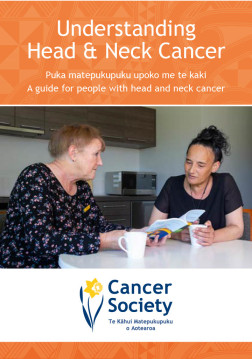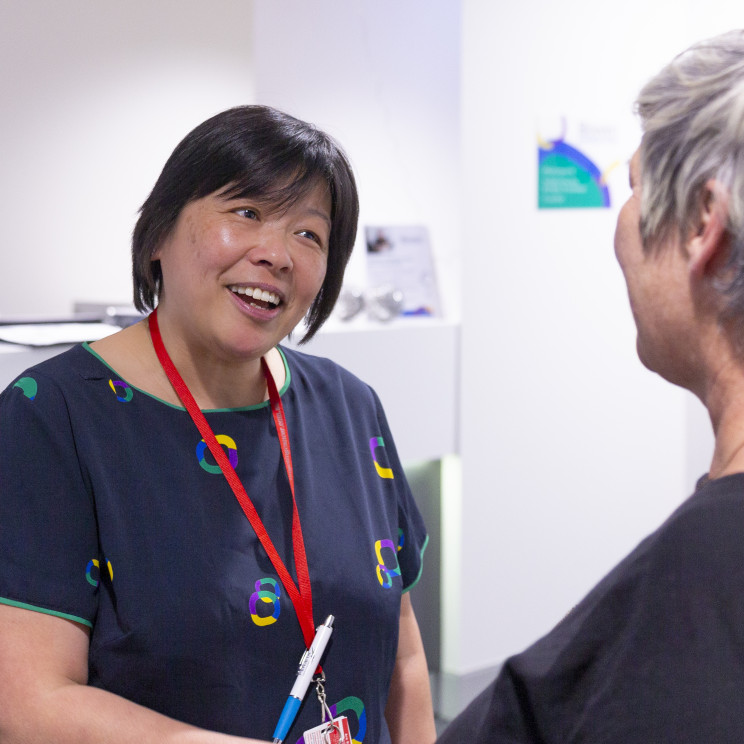Read about how treatment decisions for head and neck cancer are made, as well as who will be on your treatment team and how to get a second opinion.
Download the complete head and neck cancer booklet
Our new booklet 'Understanding head and neck cancer' is available now.

Download section four of our head and neck cancer booklet: Making treatment decisions
- The treatment choices you are offered will be based on all the information available about the cancer, and your general health.
- The recommended treatment will depend on:
- The type of head and neck cancer and its stage
- If the cancer is positive for HPV
- How treatment will affect your appearance and function (e.g. speech and ability to chew and swallow)
- Your general health
- Your personal wishes and goals of care.
- You will be cared for by a team of health professionals.
- Before you visit your treatment team, make a list of any questions that you would like them to answer.
- You can ask another doctor for a second opinion about the cancer or your treatment options if you want to.
- Ka hāngai katoa ngā maimoatanga ka tukuna ki a koe i runga i ngā mōhiohio e wātea ana e pā ana ki te matepukupuku me tō hauora whānui.
- Ka whakawhirinaki te maimoatanga ka taunakitia ki ēnei:
- Te momo matepukupuku upoko me te kaki, me te wāhanga kua eke
- Mehemea kua mautika te matepukupuku i te Human Papilloma Virus (HPV)
- Ka pēhea te whaipānga o te maimoatanga ki tō āhua me tō āheitanga ki te noho ora tonu (arā, te kōrero, te āheitanga ki te ngaungau me te horomi)
- Tō hauora whānui
- Ōu ake hiahia whaiaro me ōu ake whāinga manaakitanga
- Ka tiakina koe e tētahi kapa maimoatanga ngaio hauora.
- I mua i tō tūtaki i tō kapa maimoatanga, whakaritea he rārangi o ngā pātai e hiahia ana koe mā rātou hei whakautu.
- E āhei ana koe ki te pātai ki tētahi atu tākuta mō tētahi whakataunga tuarua e pā ana ki te matepukupuku, ki ōu nā kōwhiringa maimoatanga mehemea e hiahia ana koe.

How treatment decisions are made
The treatment choices you are offered will be based on all the information available on the cancer and your general health.
Recommendations will depend on:
- The type of head and neck cancer and its stage
- Whether the cancer is positive for HPV
- How treatment will affect your appearance and function (e.g. speech, ability to chew and swallow)
- Your general health
- Your personal wishes and goals of care.
The treatment team
From the time that you are diagnosed with head and neck cancer you will be cared for by a team of health professionals who may include:
- your GP or whānau doctor, who will often be the first person you see
- the hospital dentist (and after treatment, your own dentist)
- oncology nurses and cancer care coordinators, who specialise in care for people receiving cancer treatment
- an ear, nose, and throat surgeon or maxillofacial surgeon who specialises in surgery of the mouth, jaw, face, and neck
- a plastic surgeon who specialises in reconstructive surgery of the head and neck
- a medical oncologist, who specialises in the use of different medications to treat cancer
- a radiation oncologist, who specialises in the use of radiation treatment
- a speech-language therapist who specialises in helping with communication and swallowing problems
- a dietician who helps with nutrition and diet changes during and after
treatment.
Your treatment team may also include other health care professionals such as a social worker, psychologist, physiotherapist, practice nurse, community health nurse, pharmacist, occupational therapist, counsellor/psychologist, or palliative care specialist.
Talking to your cancer treatment team
When you first learn you have head and neck cancer, you may have many questions. Before you visit your treatment team, we suggest that you think about the questions you would like them to answer and how much detail you are comfortable with. There is a lot of information to take in, so it could be helpful to have a support person with you when you visit. See page 72 for some questions you may wish to ask your treatment team.
It is useful to ask your treatment team who to contact, and how, if you have any questions outside your appointment times.
Asking for a second opinion
You may want to ask another doctor about your cancer or treatment, to help you feel more confident about your treatment decision. You can ask your cancer treatment team or your GP or whānau doctor to refer you to another doctor to get a second opinion.
Your rights—Health and Disability Commission
Your rights as a health and disability service consumer are protected by the Health and Disability Commission’s Code of Rights. If you have concerns about a health and disability service, independent advocates are available to support and guide you, or you can complain directly to the Health and Disability Commissioner.
Find more about the Health and Disability Commission
Interpreting services
New Zealand’s Code of Health and Disability Services Consumers’ Rights states that everyone has the right to have an interpreter present during a medical appointment. If you do not speak English as your first language, or you are deaf, you may find it helpful to use an interpreter when you have your hospital appointments. Speak to a member of your treatment team about arranging interpreters in your local area.
Talking to others
Once you have talked about your treatment options with your treatment team, you may want to discuss your options with other people. Talking it over can help you decide what is right for you. You may want to talk to your whānau or friends, specialist nurses, your GP or whānau doctor, the Cancer Society, a hospital social worker, or a spiritual advisor.
Coping with waiting
Waiting is a big part of receiving your diagnosis and starting treatment. It can take several days, or even weeks, for your treatment team to review your test results and decide on what treatment options are best for you.
Contact your treatment team who will be able to give you an indication about the likely waiting time. They can also refer you for additional support if needed e.g. counselling.
Taking part in a clinical trial
There are many new and emerging treatments for cancer. Clinical trials are a vital part of the search to find better treatments for cancer.
Clinical trials test new and modified treatments to see if they are better than existing treatments. If you are offered a place in a randomised clinical trial, you will receive either the standard treatment currently available or the new treatment being tested. Neither you nor your doctor can decide which treatment you get.
People all over the world have taken part in clinical trials that have improved cancer treatments, but not all treatments tested in trials turn out to be helpful. If you are asked to take part in a clinical trial, make sure you fully understand the reasons for the trial and what it means for you. It is your decision whether you take part in a trial or not.
